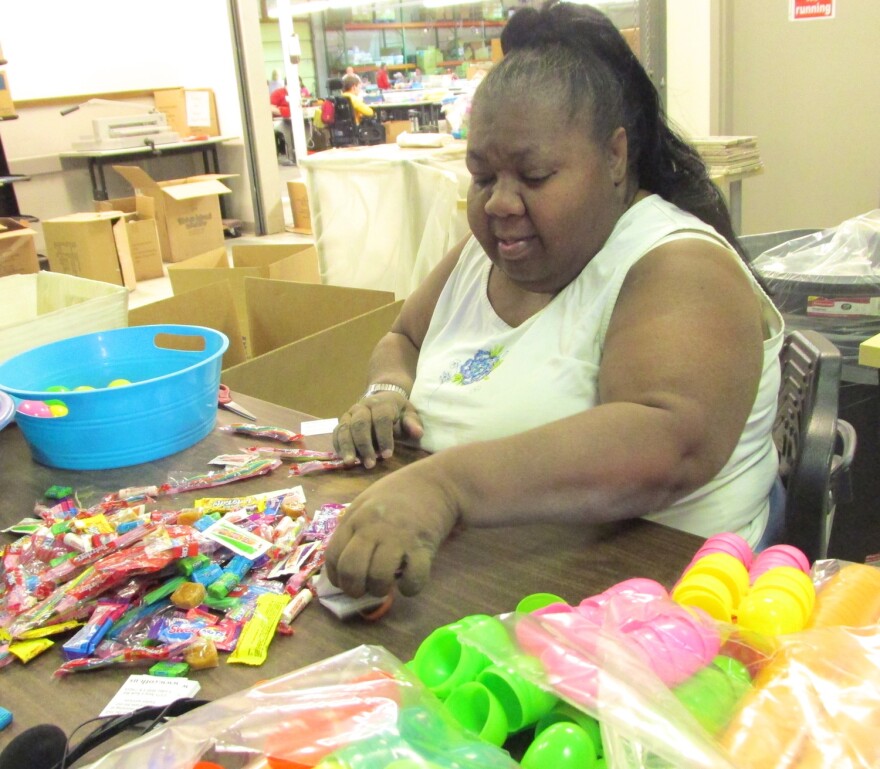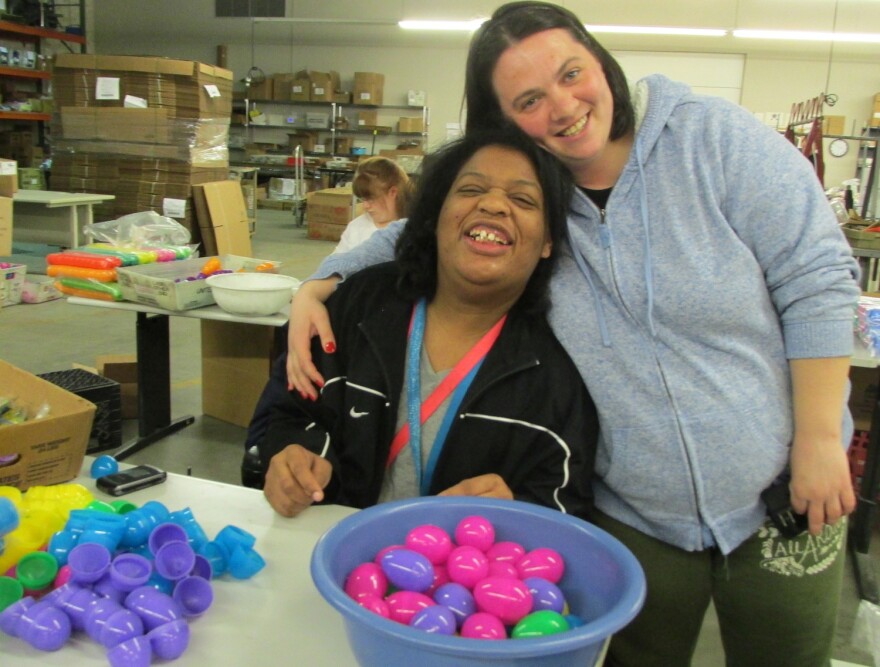The expert Easter egg fillers at Canterbury Enterprises in Shrewsbury packed 5.5 million plastic eggs with candy and toys this year — a new record for the nonprofit sheltered workshop that employs about 100 people with disabilities.
And this weekend, those blue and pink and yellow eggs will be hidden by the thousands at parks and churches and dropped out of helicopters at Easter egg hunts all over the U.S.

Charlie Fischer, manager of the workshop, says filling eggs for American Carnival Mart of St. Louis provides year-round work for his employees who have extreme physical and developmental impairments.
“A lot of my people have more than one disability,’’ he said.
The workshop also does jobs for other local businesses — packaging and stuffing envelopes, but Fischer says the egg-filling has grown every year since they started it six years ago.
On this day in mid-March, Michelle English, 32, sat at a table putting bright smiley-face stickers into blue plastic eggs. She’s been employed at the workshop for about a year and says she has made friends here.
“We joke and we talk,’’ she said. “It’s nice to have friends to help the day go by quicker.
English said she likes her paycheck, too.
“When I got the first check it was really exciting,’’ she said. “It was nice to feel good that I worked and got paid for it.’’
'She feels like she’s doing something'
The workers are paid a piece-work rate, just a penny or two an egg. And they pay taxes — Social Security and Medicare — like other Americans.

The paychecks aren’t big, but there are other benefits, said Cindy Pennington, whose daughter Jessica Cruts, 29, works at Canterbury.
Cruts was hired by the workshop after she turned 21 and aged out of programs offered by the St. Louis County Special School District. She has reading and hearing impairments.
“Canterbury is where she is comfortable,’’ Pennington said. “She wants to work. She enjoys working. Her paycheck is hardly anything, but to her it’s everything. She feels like she’s doing something.’’
Cruts, who has Down syndrome, lives at home.
“She can’t cook. She can’t read. She can’t balance a checkbook. So we’ll take care of her,’’ Pennington said. “She’ll live at home, and that’s OK because then I know she’ll be OK. She’ll be safe.’’
Pennington volunteers as a board member at Canterbury. She also serves as an advocate for the employees to ensure that their needs are met, even if they can’t verbalize them. Sometimes, it’s a simple thing, like buying a new microwave for the lunchroom that doesn’t require reading skills to use.
Cruts tried working at private businesses -- bagging groceries and working at a restaurant -- but she was uncomfortable and unhappy in those environments, Pennington said.
“This is a safe environment,’’ she said. “Jessica is coming to a place where there are people who have disabilities but want to work. A bunch of people who come together to do a job.’’
Pennington believes that it’s important for children with disabilities to have opportunities and to be mainstreamed in school if it’s right for them, but that it’s not possible for everyone. And neither is finding work in the private business sector, she said.

Some workers are able to use Canterbury as a steppingstone to learn work skills and then move on to other jobs, but Pennington doesn’t think that is a possibility for her daughter.
“She’s 29 and has not learned to read,’’ she said. “With Canterbury she doesn’t have to read. She can take a toy and put it in an Easter egg and feel happy.’’
Pennington worries about the growing debate over sheltered workshops and efforts to change the federal minimum wage law that would prevent disabled people from being paid below minimum wage. She appreciates the intent, but she fears that if sheltered workshops close, her daughter will be left with few options.
“When others say they should be making more -- right, they should be making more, however, you can’t expect something that’s not there,’’ she said.
Sheltered workshops employ 7,500 in Missouri
Canterbury was founded in 1983 by the United Cerebral Palsy Association of Greater St. Louis as an employment program for people with orthopedic disabilities. Its mission expanded over the years, and the workshop now employs people with other types of severe or multiple disabilities, such as Down syndrome and autism.
In addition to its contract work with businesses, the workshop receives funding from the county and city and the Missouri Department of Elementary and Secondary Education, which certifies sheltered workshops in the state. There are 93 programs in the state, employing about 7,500 people.
Canterbury helps employees develop work skills, Fischer said. Some will transition to other jobs, while others will retire from Canterbury. The workshop provides assistance for people who need help with personal care, including using the restroom.
Canterbury doesn’t have a monopoly on filling Easter eggs in the state. SWI Industrial Solutions, a sheltered workshop in Springfield, Mo., fills eggs for Sunny Bunny, a distributor headquartered in that city.
To learn more:
North County Public Radio in New York delved into the issues surrounding sheltered workshops and talked to advocates on both sides of the debate. Here's a link.



